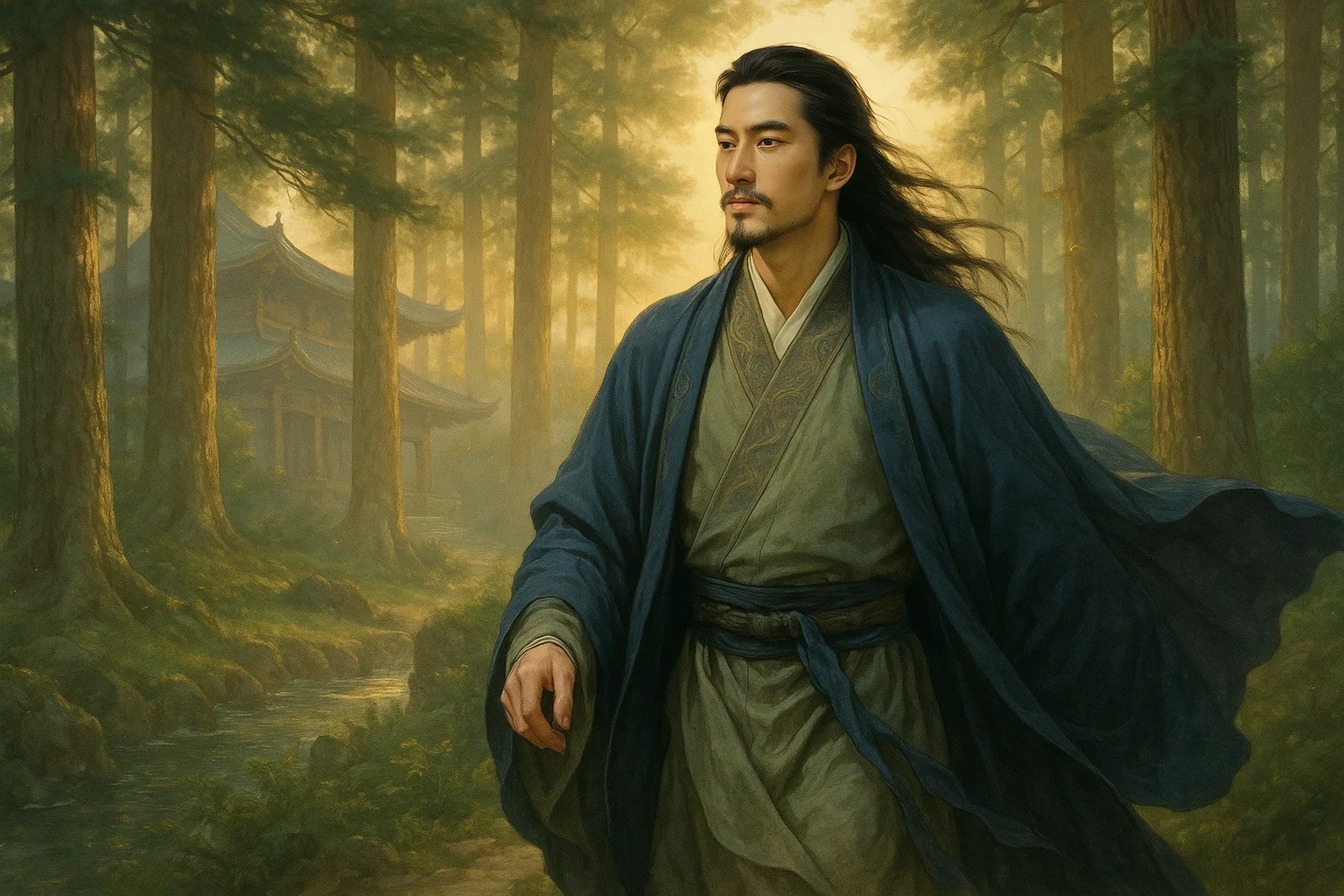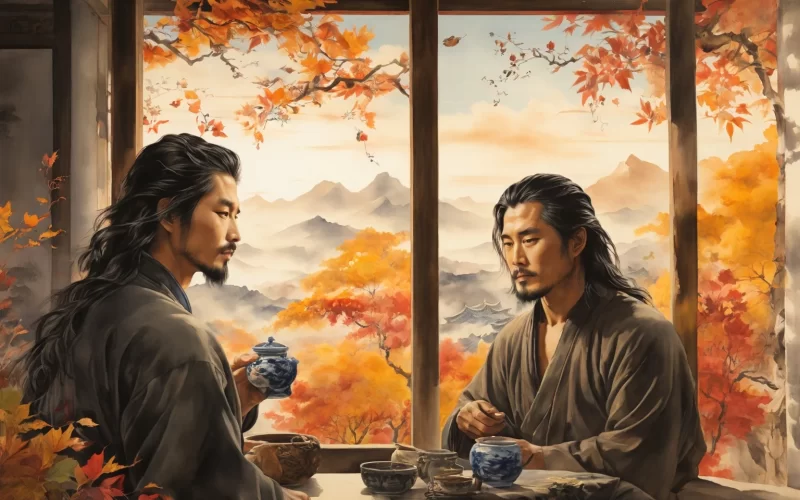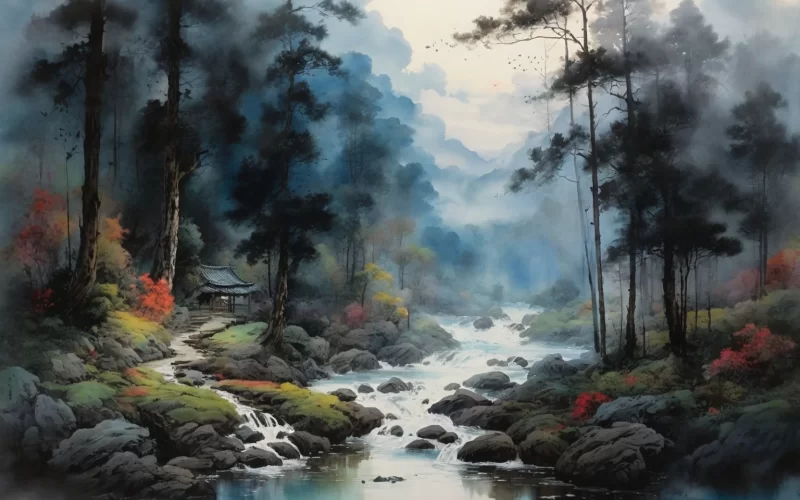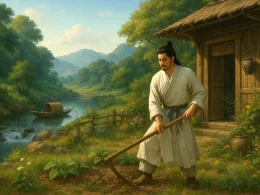We used to be companions on the Jiang and the Han,
And as often as we met, we were likely to be tipsy.
Since we left one another, floating apart like clouds,
Ten years have run like water-till at last we join again.
And we talk again and laugh again just as in earlier days,
Except that the hair on our heads is tinged now with grey.
Why not come along, then, all of us together,
And face the autumn mountains and sail along the Huai?
Original Poem
「淮上喜会梁川故人」
韦应物
江汉曾为客,相逢每醉还。
浮云一别后,流水十年间。
欢笑情如旧,萧疏鬓已斑。
何因北归去?淮上对秋山。
Interpretation
Composed during Wei Yingwu's later years in retirement at Huaishang, this poem captures a chance reunion with a long-lost friend from his Liangzhou days. While the title's character "喜" (joy) sets the tone, the verses subtly interweave poignant reflections on time's passage, aging, and life's wanderings. Blending past and present with profound sincerity, the poem resonates with deep existential contemplation.
First Couplet: "江汉曾为客,相逢每醉还。"
Jiānghàn céng wéi kè, xiāngféng měi zuì huán.
By Yangtze and Han once wandered I; Each meeting saw us drunk before goodbye.
The recollection of youthful camaraderie, where every parting followed convivial drinking, vividly portrays their past intimacy through economical yet potent imagery.
Second Couplet: "浮云一别后,流水十年间。"
Fúyún yī bié hòu, liúshuǐ shí nián jiān.
Like scattered clouds we drifted apart; Ten years have flowed—a stream's swift dart.
Employing "floating clouds" and "flowing water" as metaphors for separation and time's passage, this couplet layers joyful reunion with melancholic awareness of life's transience.
Third Couplet: "欢笑情如旧,萧疏鬓已斑。"
Huānxiào qíng rú jiù, xiāoshū bìn yǐ bān.
Laughter's warmth remains unchanged it seems, Though temples now thread silver streams.
The bittersweet contrast between enduring friendship and physical aging poignantly captures time's paradoxical gifts and thefts.
Fourth Couplet: "何因北归去?淮上对秋山。"
Hé yīn běi guī qù? Huáishàng duì qiū shān.
Why northward turn your steps once more? Here by Huai's autumn hills I stay—my door.
The rhetorical question and concluding landscape image reveal Wei's contentment in reclusion, transforming farewell into a quiet affirmation of chosen solitude.
Holistic Appreciation
Beneath the surface joy of reunion, the poem orchestrates a symphony of temporal awareness—past conviviality (1), intervening years (2), present aging (3), and future paths (4). Its power derives from understated paradoxes: laughter amidst graying hair, enduring bonds despite life's flux. The "autumn hills" finale crystallizes Wei's hard-won serenity, having traded youthful revelry for contemplative solitude.
Artistic Merits
The poem employs a past-present juxtaposition structure, weaving together recollection, lamentation and present reality to create layered emotional depth across temporal dimensions. Its language is deceptively simple yet profoundly natural, with resonant imagery—"floating clouds," "flowing water," and "autumn mountains"—that intensifies the poem's meditation on time's passage and life's impermanence. The concluding couplet masterfully deploys a rhetorical question, simultaneously expressing reluctant farewell to the departing friend and embodying the poet's contentment in reclusive life. This artful closure demonstrates remarkable concision while yielding infinite aftertaste.
Insights
The poem illuminates friendship's dual nature—its ability to transcend time while being inevitably marked by it. Wei's acceptance of autumn hills as spiritual home offers a model for embracing life's seasons: honoring past connections while peacefully inhabiting one's present station. For contemporary readers, this Tang meditation suggests that true reunion lies not in recapturing lost youth, but in recognizing how shared history deepens present understanding, even amidst life's irreversible currents.
Poem translator
Kiang Kanghu
About the poet

Wei Yingwu (韦应物), circa 737 - 786, was a native of Chang'an, Beijing. His poems were collected in the Wei Suzhou Collection, which included poems concerned with the plight of the people, expressions of disobedience to the times and indignation against the world, and descriptions of idyllic landscapes, etc., of which the ones describing idyllic landscapes are the most famous, and have been sung by posterity in particular.












